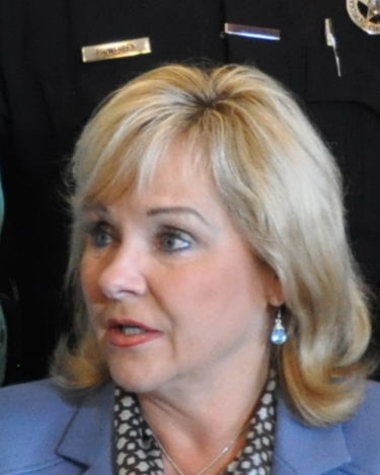Oklahoma governor gets little of her requests in 2016 budget

Oklahoma City (AP) — Knowing this year's legislative session would be tumultuous with a giant hole in the budget, Gov. Mary Fallin challenged lawmakers at the start of session to make structural improvements to the budget and put new, stable sources of revenue on the table.
She pushed for bold proposals like a teacher pay raise, a tax on cigarettes, school district consolidation, and modernizing the sales tax code.
"It will require hard work and important votes," the two-term GOP governor told legislators in her February State of the State address. "It will be the right thing to do for future generations of Oklahomans."
But when the gavel fell on the 2016 session last week, Fallin got very little of what she requested. A school consolidation plan met fierce resistance from teachers and parents and was derailed in the first few weeks of session. The proposed $1.50-per-pack cigarette tax died on the House floor when the Democrats locked up against it in an effort to trigger an infusion of federal funding through a Medicaid plan that Fallin supported. And a plan to broaden the sales tax to help pay for a teacher pay raise never even came up for a vote in a House committee.
The governor, who typically reflects on the end of the legislative session with a news conference, opted instead to just release a statement in which she touted a budget agreement that shielded K-12 schools and health care from deep cuts, but also acknowledged missed opportunities.
"We still need to do more to address structural imbalances in the state's budget, fix problematic tax policies and make available more recurring, stable revenue," said Fallin, who overall gave the session a C+ letter grade. "I was also disheartened lawmakers did not address an important health improvement by failing to approve a personal consumption tax on cigarettes."
The budget itself, a nearly $6.8 billion spending plan that Fallin had until midnight Saturday to sign, reflects an agreement reached among the governor and Republican House and Senate leaders. While it shields public K-12 schools and the state's Medicaid agency from deep cuts, it used a variety of one-time revenue to plug the budget hole, including $200 million in transportation bonds, $100 million from a road and bridge construction fund, $35 million from the state's Unclaimed Property Fund, and more than $140 million from the state's Rainy Day Fund. Lawmakers swept another $82 million from agency revolving accounts and used the money for ongoing agency expenses.
Oklahoma Treasurer Ken Miller, an economist who gave the session a C grade, said lawmakers used too much one-time sources of revenue and missed an opportunity to address "overly generous" tax credits to the wind industry, broaden the tax base or find a recurring funding source for public health.
"Until lawmakers come to terms with the reality that their desire to spend outstrips their desire to generate revenue, Oklahoma will continue to have structurally unbalanced budgets," Miller said.
House and Senate Democrats opposed the spending plan not just because it imposed deep cuts to many state agencies, including more than $150 million from last year's funding for state colleges and universities, but also because it imposed particular hardships on the working class by eliminating the refundable portion of an earned income tax credit claimed by nearly 355,000 low-income Oklahomans.
The Democratic leaders in the House and Senate repeatedly called on Republican leaders to roll back a .25-percent cut in the individual income tax rate that went into effect Jan. 1 and cost the state $52 million this year and a projected $135 million next year. But GOP leaders expressed no desire to revisit the tax cut.
"This crisis is caused by the appalling combination of short sighted, politically motivated tax cuts, a blind reliance on a narrow tax base rooted in a volatile, oil-based economy, a dependence on raiding one-time monies for ongoing expenses, and the majority's willful ignorance of the needs of hardworking Oklahomans," Senate Democratic Leader John Sparks said in a statement.
Still, Fallin did have some legislative accomplishments this year. Lawmakers approved a second, $125 million bond issue to finish a major renovation to the state Capitol and passed a series of criminal justice bills aimed at slowing prison population growth, both long-term priorities of Fallin.
By Sean Murphy, Associated Press. Copyright 2016 The Associated Press. All rights reserved. This material may not be published, broadcast, rewritten or redistributed.
The Gayly – June 4, 2016 @ 1:30 p.m.





